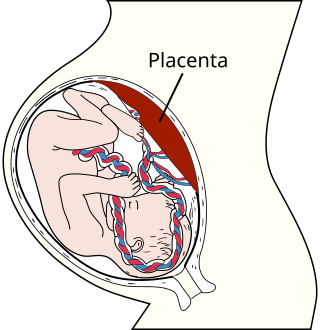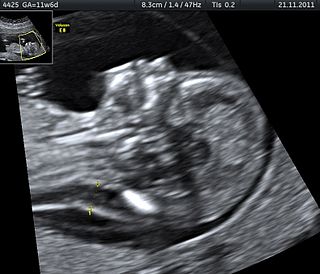Related Research Articles

The placenta is a temporary embryonic and later fetal organ that begins developing from the blastocyst shortly after implantation. It plays critical roles in facilitating nutrient, gas and waste exchange between the physically separate maternal and fetal circulations, and is an important endocrine organ, producing hormones that regulate both maternal and fetal physiology during pregnancy. The placenta connects to the fetus via the umbilical cord, and on the opposite aspect to the maternal uterus in a species-dependent manner. In humans, a thin layer of maternal decidual (endometrial) tissue comes away with the placenta when it is expelled from the uterus following birth. Placentas are a defining characteristic of placental mammals, but are also found in marsupials and some non-mammals with varying levels of development.

Stillbirth is typically defined as fetal death at or after 20 or 28 weeks of pregnancy, depending on the source. It results in a baby born without signs of life. A stillbirth can result in the feeling of guilt or grief in the mother. The term is in contrast to miscarriage, which is an early pregnancy loss, and Sudden Infant Death Syndrome, where the baby dies a short time after being born alive.

Microcephaly is a medical condition involving a smaller-than-normal head. Microcephaly may be present at birth or it may develop in the first few years of life. Since brain growth is correlated with head growth, people with this disorder often have an intellectual disability, poor motor function, poor speech, abnormal facial features, seizures and dwarfism.

Cardiotocography (CTG) is a technique used to monitor the fetal heartbeat and the uterine contractions during pregnancy and labour. The machine used to perform the monitoring is called a cardiotocograph.

The 2016 Summer Olympics, officially the Games of the XXXI Olympiad and also known as Rio 2016, was an international multi-sport event held from 5 to 21 August 2016 in Rio de Janeiro, Brazil, with preliminary events in some sports beginning on 3 August. Rio de Janeiro was announced as the host city at the 121st IOC Session in Copenhagen, Denmark, on 2 October 2009.

Fetal alcohol spectrum disorders (FASDs) are a group of conditions that can occur in a person whose mother drank alcohol during pregnancy. Symptoms can include an abnormal appearance, short height, low body weight, small head size, poor coordination, behavioral problems, learning difficulties, and problems with hearing and sight. Those affected are more likely to have trouble with school, the legal system, alcohol, other drugs, and other areas of high risk. The several forms of the condition are: fetal alcohol syndrome (FAS), partial fetal alcohol syndrome (pFAS), alcohol-related birth defects (ARBD), static encephalopathy, alcohol-related neurodevelopmental disorder (ARND) and neurobehavioral disorder associated with prenatal alcohol exposure (ND-PAE). Some authorities accept only FAS as a diagnosis, seeing the evidence as inconclusive with respect to other types.

Sylvia Mary Burwell is an American government and non-profit executive who has been the 15th president of American University since June 1, 2017. Burwell is the first woman to serve as the university's president. Burwell earlier served as the 22nd United States Secretary of Health and Human Services. President Barack Obama nominated Burwell on April 11, 2014. Burwell's nomination was confirmed by the Senate on June 5, 2014, by a vote of 78–17. She served as Secretary until the end of the Obama administration. Previously, she was the Director of the White House Office of Management and Budget from 2013 to 2014.

Zika fever, also known as Zika virus disease or simply Zika, is an infectious disease caused by the Zika virus. Most cases have no symptoms, but when present they are usually mild and can resemble dengue fever. Symptoms may include fever, red eyes, joint pain, headache, and a maculopapular rash. Symptoms generally last less than seven days. It has not caused any reported deaths during the initial infection. Mother-to-child transmission during pregnancy can cause microcephaly and other brain malformations in some babies. Infections in adults have been linked to Guillain–Barré syndrome (GBS).
Vivette Glover is a British Professor of Perinatal Psychobiology at Imperial College London. She studies the effects of stress in pregnancy on the development of the fetus and child.
The MOMS Trial was a clinical trial that studied treatment of a birth defect called myelomeningocele, which is the most severe form of spina bifida. The study looked at prenatal and postnatal surgery to repair this defect. The first major phase concluded that prenatal surgery had strong, long-term benefits and some risks.

Zika virus is a member of the virus family Flaviviridae. It is spread by daytime-active Aedes mosquitoes, such as A. aegypti and A. albopictus. Its name comes from the Ziika Forest of Uganda, where the virus was first isolated in 1947. Zika virus shares a genus with the dengue, yellow fever, Japanese encephalitis, and West Nile viruses. Since the 1950s, it has been known to occur within a narrow equatorial belt from Africa to Asia. From 2007 to 2016, the virus spread eastward, across the Pacific Ocean to the Americas, leading to the 2015–2016 Zika virus epidemic.
Catherine S. Peckham FFPHM is a British paediatrician.
A pre-existing disease in pregnancy is a disease that is not directly caused by the pregnancy, in contrast to various complications of pregnancy, but which may become worse or be a potential risk to the pregnancy. A major component of this risk can result from necessary use of drugs in pregnancy to manage the disease.

Diana W. Bianchi is an American medical geneticist and neonatologist noted for her research on fetal cell microchimerism and prenatal testing. She is the director of the Eunice Kennedy ShriverNational Institute of Child Health and Human Development, part of the National Institutes of Health. Bianchi had previously been the Natalie V. Zucker Professor of Pediatrics, Obstetrics, and Gynecology at Tufts University School of Medicine and executive director of the Mother Infant Research Institute at Tufts Medical Center. She also has served as Vice Chair for Research in the Department of Pediatrics at the Floating Hospital for Children at Tufts Medical Center.

An epidemic of Zika fever, caused by Zika virus, began in Brazil and affected other countries in the Americas from April 2015 to November 2016. The World Health Organization (WHO) declared the end of the epidemic in November 2016, but noted that the virus still represents "a highly significant and long term problem". It is estimated that 1.5 million people were infected by Zika virus in Brazil, with over 3,500 cases of infant microcephaly reported between October 2015 and January 2016. The epidemic also affected other parts of South and North America, as well as several islands in the Pacific.

This article primarily covers the chronology of the 2015–16 Zika virus epidemic. Flag icons denote the first announcements of confirmed cases by the respective nation-states, their first deaths, and relevant sessions and announcements of the World Health Organization (WHO), and the U.S. Centers for Disease Control (CDC), as well as relevant virological, epidemiological, and entomological studies.
N. Scott Adzick currently serves as the Surgeon-in-Chief at Children’s Hospital of Philadelphia (CHOP) as well as the Director of CHOP’s Center for Fetal Diagnosis and Treatment, which he founded in 1995. Dr. Adzick is also the C. Everett Koop Professor of Pediatric Surgery at CHOP and a Professor of Pediatrics, Obstetrics and Gynecology at the Perelman School of Medicine at the University of Pennsylvania.
Abortion in the United States Virgin Islands is legal on request up to 24 weeks of pregnancy, and afterwards only in cases that endanger the life or health of the mother. There are five clinics in the territory. Women travel from the British Virgin Islands for abortions because it is illegal there.

Catherine Kyobutungi is an Ugandan epidemiologist who currently serves as the Executive Director of the African Population and Health Research Center and a Joep Lange Chair. She was elected to the African Academy of Sciences in 2018.
Vikki Martyne Abrahams is an English–American reproductive immunologist. She is a full professor of obstetrics, gynecology and reproductive sciences at the Yale School of Medicine. Her research focuses on understanding the role of innate immune toll-like receptor and NOD-like receptor family members in placental and maternal-fetal immune responses.
References
- 1 2 "Catherine Spong appointed NICHD Deputy Director". National Institute of Child Health and Human Development. Retrieved 5 April 2019.
- 1 2 3 4 "Catherine Y. Spong, M.D. Biosketch" (PDF). Retrieved 4 April 2019.[ permanent dead link ]
- ↑ "US Government-Funded Zika Study To Use Olympic Athletes As Guinea Pigs". Gizmodo Australia. 2016-07-06. Retrieved 2019-04-05.